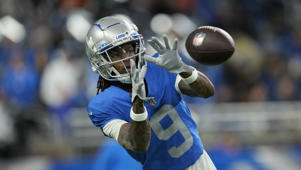
© Paul Sancya, Associated Press Detroit Lions wide receiver Jameson Williams warms up before an NFL football game against the Chicago Bears, Sunday, Jan. 1, 2023, in Detroit. The NFL has suspended five players for violating the league’s gambling policy on Friday, April 21, 2023. Detroit Lions wide receiver Quintez Cephus and safety C.J. Moore and Washington Commanders defensive end Shaka Toney were suspended indefinitely, while Lions wide receivers Stanley Berryhill and Jameson Williams have been suspended six games.
Former NFL quarterback Jim Miller may have had the best reaction to news that the NFL last week suspended five players for violating the league’s policy against players gambling on games.
“You can’t lie in bed with the devil, and not think you’re going to get burned,” he said, according to a report by The Ringer.
And yet, the fire of legal gambling keeps raging ever hotter, while America’s professional sports leagues don asbestos jackets and hope for the best.
Anyone want to lay odds on this working out?
First, the facts: Three of the suspended players were banned for wagering on NFL games last season. Two other players were suspended for six games for betting on non-NFL games at a league facility.
The Associated Press said NFL policy prohibits players and employees from wagering while at work, including at stadiums, team hotels, league or club events, as well as on team charters or transportation, or when making promotional appearances or endorsements — despite being surrounded by people who can pull out their phones and wager whenever they want.
Does anyone really believe sports can walk that tightrope forever, keeping the games pure and above suspicion while flames lap at their feet?
Ever since a landmark Supreme Court ruling in 2018, gambling has washed over American sports like a tsunami generated by the leagues themselves. Fans today can barely breathe without being assaulted by endless commercials enticing them to wager on everything from games to individual plays with “free money.” Leagues are rapidly becoming addicted to the revenue these sponsors provide.
This isn’t a tsunami confined to games. Sports are merely mirroring governments, which in many states have tethered themselves to gamblers and their promises of free money from lotteries and casinos to be used for public services, including schools.
Related
These governments ignore the facts. As author and researcher Jonathan D. Cohen wrote in a Washington Post op-ed, “these states have not seen significant improvement in their education rankings over the last two decades. Instead, the lottery has redistributed money from poor gamblers to high-achieving middle- and upper-class students.”
Sports leagues also are ignoring facts, including the nation’s long history of game-fixing scandals, as they embrace gamblers, rationalizing that gambling was happening anyway, so they might as well get a cut.
They ignore what’s happening in other countries, including a 2009 scandal that implicated about 200 soccer games across Europe. Why would the U.S. be immune to such a thing?
Many NFL teams can now legally operate online sportsbook gambling sites, and some already operate physical sportsbooks either inside or just outside their stadiums. Yet players are expected to refrain.
Writing for The New York Times, Jenny Vrentas, Ken Belson and Kevin Draper said the latest NFL suspensions raise “questions about the precarious line the N.F.L. is trying to walk on gambling.”
They quote Marc Edelman, a law professor and director of sports ethics at Baruch College, who said all this advertising, coupled with the league’s harsh warnings to players, create a “cognitive dissonance.”
“Now, the young athletes are coming up in professional sports leagues with mixed messaging, not just from society and gambling companies, but from the sports leagues themselves,” he said.
Former Cincinnati Bengals linebacker Larry Stevens puts it in simpler language.
“The whole situation is a joke that the NFL and its teams profit off gambling, but players can’t gamble,” The Associated Press quoted him saying.
Related
The tsunami isn’t just washing over professional sports. In an interview with on3.com, Tom McMillen, a former congressman and current CEO of an association that deals with issues facing athletic departments at the highest-level colleges, said betting is the biggest problem facing college sports today, too.
“The sports integrity experts will say there is 100% probability of a sports betting scandal on a campus — 100% probability — within the next few years,” he said.
McMillen said the NCAA hasn’t studied the gambling habits of students in more than 20 years. NFL spokesman Brian McCarthy told The Associated Press he can’t go into specifics about how the league monitors its players for gambling, but it provides regular training on the gambling policy to all players.
The bottom line is, sports leagues all understand they could be ruined by a major scandal that casts doubt on the fairness of games. Yet they keep dancing ever closer to the fire.
Meanwhile, the personal finance website wallethub.com came out with its annual ranking on the most gambling-addicted states in the country. Once again, Utah finished last.
We should celebrate that at least one state knows that the best way to avoid a bad thing is to not invite it to live in your house.